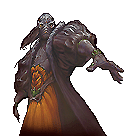Manshoon 
Join Date: October 25, 2002
Location: Gilbert, Az
Age: 73
Posts: 234
|
Ouch. Wereboar is right about hidden gadgets. I did use this party the first time I played (first time I made it to Arnika, that is), and found all of the objects but I used search mode and later the Detect Secrets Spell a lot, after checking each area for monsters, everywhere there might possibly be anything.
I have also run a party with a Ranger instead of a Gadgeteer, and that was an excellent party. The Ranger will automatically find everything for you, and the Ranged capability is nice. With the ranger you can either put them in the front line or in the backrow. I put mine in the back row, and went for high Intelligence (and Powercast) as well as Senses (and Eagle Eye), but Sensus and Dexterity (and then Strength plus either Intelligence, Speed or even Vitality might be more conservative for a first time using a Ranger. If you don't have a Gadgeteer, your Bard will need to learn Locks and Traps.
Wereboar's suggestion of a Fighter instead of Gadgeteer is a good one, for the purpose of protecting your casters, as he said, but there is a subtle danger. I usually recommend a slower developing character with some magic ability (a little or a lot) in that sixth slot, like a Gadgeteer or Ranger, specifically because your party needs the early training of not having the front line too stong. As a new (new to Wizardry8 but not RPGs) play you will need to figure out how to stop the approaching enemy in their tracks, kill them before, or slightly after, they get to you, and heal, cure and protect your party with spells when you need to. You will also need to learn the use of objects, such as potions, powders and the special attributes of certain weapons, armor and items. To succeed with a party like this it is necessary to learn to rely on Magic, and nothing else, to win your battles, using your Melee or Ranged capability to complement, clean up after and in some cases add to the magic damage capability of the Party.
With the Fighter there is a chance you would get into a habit of bashing your way through the easier battles.
It is better, IMO, for you to get lots of practice relying on Magic in the Lower Monestary and Arnika, where starting over is no big deal (if you need to), rather than reaching the later parts of the game and suddenly realizing you don't have the player skills you need to use a Magic-Heavy party there. By that point your Fighter will not be enough to protect you any more. There's a real orientation to playing such a party and relying on Magic to kill. Of course a Fighter can even be a great asset in the later game (tremendous) if you also have also developed those Magic skills, so it's up to you.
The Fighter will make it easier at first, but if you decide to go that route, be sure to rely on Magic rather than Melee in your fights, and take the time to replenish your Magic between battles, with short naps (not full 8 hour sleeps), if it gets depleted. If instead you do find yourself preferring to just use Melee mostly, you might be better off with a Melee-oriented party. You can have a Bard and Gadgeteer in one of those also (a Bishop also fits nicely).
Shields, as Wereboar suggests, are an excellent idea in any case. Their benifits are far more than the straight AC the shield itself provides. Many enemy attacks that hit, hit the shield instead and are wasted. In the original party recommended above, the Bard, Priest and Gadgeteer are good candidates for a shield. I would recommend it for the Ranger, also (along with a Sword) and it sounds like Wereboar recommends it if you go with his suggestion of a Fighter. Don't neglect the Shield Skill, if you use a shield.
[ 07-02-2003, 08:25 PM: Message edited by: EEWorzelle ]
|